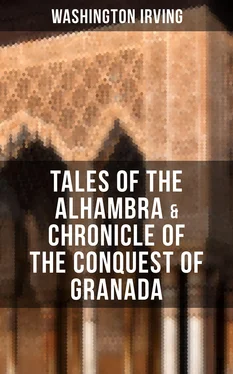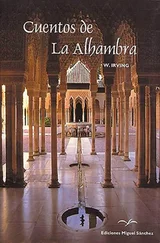He, however, who would behold this scene under an aspect more in unison with its fortunes, let him come when the shadows of evening temper the brightness of the court, and throw a gloom into surrounding halls. Then nothing can be more serenely melancholy, or more in harmony with the tale of departed grandeur.
At such times I am apt to seek the Hall of Justice, whose deep shadowy arcades extend across the upper end of the court. Here was performed, in presence of Ferdinand and Isabella, and their triumphant court, the pompous ceremonial of high mass, on taking possession of the Alhambra. The very cross is still to be seen upon the wall, where the altar was erected, and where officiated the Grand Cardinal of Spain, and others of the highest religious dignitaries of the land. I picture to myself the scene when this place was filled with the conquering host, that mixture of mitred prelate and shaven monk, and steel-clad knight and silken courtier; when crosses and crosiers and religious standards were mingled with proud armorial ensigns and the banners of haughty chiefs of Spain, and flaunted in triumph through these Moslem halls. I picture to myself Columbus, the future discoverer of a world, taking his modest stand in a remote corner, the humble and neglected spectator of the pageant. I see in imagination the Catholic sovereigns prostrating themselves before the altar, and pouring forth thanks for their victory; while the vaults resound with sacred minstrelsy, and the deep-toned Te Deum.
The transient illusion is over — the pageant melts from the fancy — monarch, priest, and warrior, return into oblivion, with the Moslems over whom they exulted. The hall of their triumph is waste and desolate. The bat flits about its twilight vault, and the owl hoots from the neighboring Tower of Comares.
Entering the Court of the Lions a few evenings since, I was almost startled at beholding a turbaned Moor quietly seated near the fountain. For a moment one of the fictions of the place seemed realized: an enchanted Moor had broken the spell of centuries, and become visible. He proved, however, to be a mere ordinary mortal; a native of Tetuan in Barbary, who had a shop in the Zacatin of Granada, where he sold rhubarb, trinkets, and perfumes. As he spoke Spanish fluently, I was enabled to hold conversation with him, and found him shrewd and intelligent. He told me that he came up the hill occasionally in the summer, to pass a part of the day in the Alhambra, which reminded him of the old palaces in Barbary, being built and adorned in similar style, though with more magnificence.
As we walked about the palace, he pointed out several of the Arabic inscriptions, as possessing much poetic beauty.
“Ah, senor,” said he, “when the Moors held Granada, they were a gayer people than they are nowadays. They thought only of love, music, and poetry. They made stanzas upon every occasion, and set them all to music. He who could make the best verses, and she who had the most tuneful voice, might be sure of favor and preferment. In those days, if anyone asked for bread, the reply was, make me a couplet; and the poorest beggar, if he begged in rhyme, would often be rewarded with a piece of gold.”
“And is the popular feeling for poetry,” said I, “entirely lost among you?”
“By no means, senor; the people of Barbary, even those of lower classes, still make couplets, and good ones too, as in old times, but talent is not rewarded as it was then; the rich prefer the jingle of their gold to the sound of poetry or music.”
As he was talking, his eye caught one of the inscriptions which foretold perpetuity to the power and glory of the Moslem monarchs, the masters of this pile. He shook his head, and shrugged his shoulders, as he interpreted it. “Such might have been the case,” said he; “the Moslems might still have been reigning in the Alhambra, had not Boabdil been a traitor, and given up his capital to the Christians. The Spanish monarchs would never have been able to conquer it by open force.”
I endeavored to vindicate the memory of the unlucky Boabdil from this aspersion, and to show that the dissensions which led to the downfall of the Moorish throne, originated in the cruelty of his tiger-hearted father; but the Moor would admit of no palliation.
“Muley Abul Hassan,” said he, “might have been cruel; but he was brave, vigilant, and patriotic. Had he been properly seconded, Granada would still have been ours; but his son Boabdil thwarted his plans, crippled his power, sowed treason in his palace, and dissension in his camp. May the curse of God light upon him for his treachery!” With these words the Moor left the Alhambra.
The indignation of my turbaned companion agrees with an anecdote related by a friend, who, in the course of a tour in Barbary, had an interview with the Pacha of Tetuan. The Moorish governor was particular in his inquiries about Spain and especially concerning the favored region of Andalusia, the delights of Granada, and the remains of its royal palace. The replies awakened all those fond recollections, so deeply cherished by the Moors, of the power and splendor of their ancient empire in Spain. Turning to his Moslem attendants, the Pacha stroked his beard, and broke forth in passionate lamentations, that such a sceptre should have fallen from the sway of true believers. He consoled himself, however, with the persuasion, that the power and prosperity of the Spanish nation were on the decline; that a time would come when the Moors would reconquer their rightful domains; and that the day was perhaps not far distant, when Mohammedan worship would again be offered up in the Mosque of Cordova, and a Mohammedan prince sit on his throne in the Alhambra.
Such is the general aspiration and belief among the Moors of Barbary, who consider Spain, or Andaluz, as it was anciently called, their rightful heritage, of which they have been despoiled by treachery and violence. These ideas are fostered and perpetuated by the descendants of the exiled Moors of Granada, scattered among the cities of Barbary. Several of these reside in Tetuan, preserving their ancient names, such as Paez and Medina, and refraining from intermarriage with any families who cannot claim the same high origin. Their vaunted lineage is regarded with a degree of popular deference, rarely shown in Mohammedan communities to any hereditary distinction, excepting in the royal line.
These families, it is said, continue to sigh after the terrestrial paradise of their ancestors, and to put up prayers in their mosques on Fridays, imploring Allah to hasten the time when Granada shall be restored to the faithful: an event to which they look forward as fondly and confidently as did the Christian crusaders to the recovery of the Holy Sepulchre. Nay, it is added, that some of them retain the ancient maps and deeds of the estates and gardens of their ancestors at Granada, and even the keys of the houses, holding them as evidences of their hereditary claims, to be produced at the anticipated day of restoration.
My conversation with the Moor set me to musing on the fate of Boabdil. Never was surname more applicable than that bestowed upon him by his subjects of El Zogoybi, or the Unlucky. His misfortunes began almost in his cradle, and ceased not even with his death. If ever he cherished the desire of leaving an honorable name on the historic page, how cruelly has he been defrauded of his hopes! Who is there that has turned the least attention to the romantic history of the Moorish domination in Spain, without kindling with indignation at the alleged atrocities of Boabdil? Who has not been touched with the woes of his lovely and gentle queen, subjected by him to a trial of life and death, on a false charge of infidelity? Who has not been shocked by his alleged murder of his sister and her two children, in a transport of passion? Who has not felt his blood boil, at the inhuman massacre of the gallant Abencerrages, thirty-six of whom, it is affirmed, he ordered to be beheaded in the Court of Lions? All these charges have been reiterated in various forms; they have passed into ballads, dramas, and romances, until they have taken too thorough possession of the public mind to be eradicated. There is not a foreigner of education that visits the Alhambra but asks for the fountain where the Abencerrages were beheaded, and gazes with horror at the grated gallery where the queen is said to have been confined; not a peasant of the Vega or the Sierra, but sings the story in rude couplets, to the accompaniment of his guitar, while his hearers learn to execrate the very name of Boabdil.
Читать дальше












